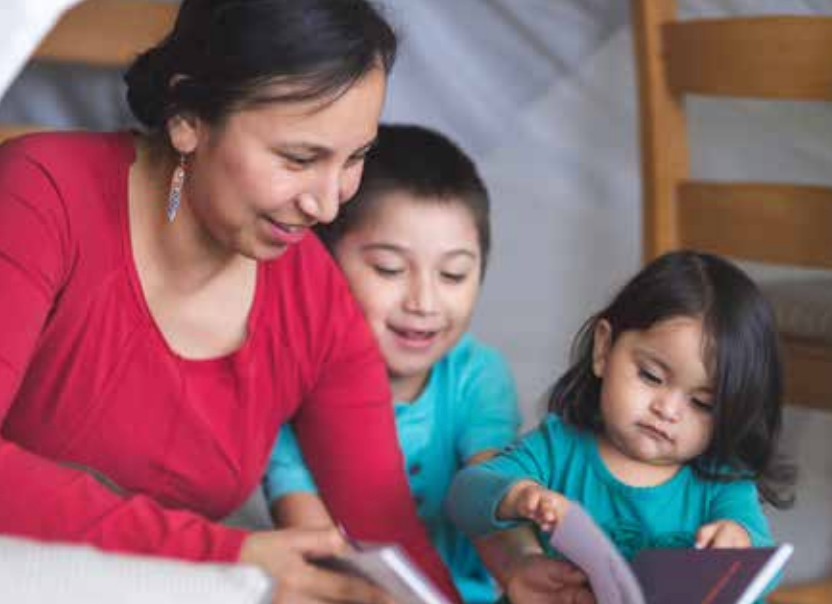
2. Foundational Knowledge

Draws from a broad and diverse knowledge base to understand infants, young children, families, and program or other setting staff from diverse racial/ethnic and language backgrounds, and how they relate to one another. Turns to a variety of disciplines and theories to inform the direction of consultation.

Unless otherwise noted, the IECMH competencies refer to Infant Family Specialist and Early Childhood Family Specialist. If an “MHS” is noted, this competency is related to Infant Mental Health Specialist and Early Childhood Mental Health Specialist. “MHM” refers to Infant Mental Health Mentor and Early Childhood Mental Health Mentor.
2A.1. Appreciates and embraces multidisciplinary approaches to working with infants, young children, families, caregivers, and staff who work in programs or other settings serving infants, young children, and families, drawing on areas of study that include professional consultation, mental health, early education, early childhood development, infant and early childhood mental health, family and/or systems functioning, culture, race and equity, and antiracism approaches.
Essential or important?: Important
Important
IECMHC Endorsement Competency:  Administration (MHM)
Administration (MHM)
Knowledge/Skill Area:  Program Evaluation (MHM)
Program Evaluation (MHM)
As Demonstrated by/Other Work Experience (and Interview):  Applies research findings to culturally sensitive, relationship-focused policies promoting infant mental health
Applies research findings to culturally sensitive, relationship-focused policies promoting infant mental health
2A.2. Understands that an infant's or young child's physical environment, experience of attachment, social relationships, race/ethnicity, primarly language, culture, abilities, disposition, and life circumstances all impact behavior and social and emotional well-being. Uses this knowledge to support change in one or more of these realms to improve infant and young child outcomes.
Essential or important?: Essential
Essential
IECMHC Endorsement Competency:  Theoretical Foundations
Theoretical Foundations
Knowledge/Skill Area:  Infant/Young Child Development & Behavior (MHS)
Infant/Young Child Development & Behavior (MHS)
As Demonstrated by/Other Work Experience (and Interview):  Understands both typical and atypical development during pregnancy, infancy, and early childhood through formal observation, assessment, and in day-to-day interactions with the infant/young child and family; Understands the conditions that optimize early infant brain development Supports provision of information, guidance, and support to families related to the development and care of infants and young children to further develop parenting capabilities and the attachment relationship
Understands both typical and atypical development during pregnancy, infancy, and early childhood through formal observation, assessment, and in day-to-day interactions with the infant/young child and family; Understands the conditions that optimize early infant brain development Supports provision of information, guidance, and support to families related to the development and care of infants and young children to further develop parenting capabilities and the attachment relationship
2A.2. Understands that an infant's or young child's physical environment, experience of attachment, social relationships, race/ethnicity, primarly language, culture, abilities, disposition, and life circumstances all impact behavior and social and emotional well-being. Uses this knowledge to support change in one or more of these realms to improve infant and young child outcomes.
Essential or important?: Important
Important
IECMHC Endorsement Competency:  Theoretical Foundations
Theoretical Foundations
Knowledge/Skill Area:  Cultural Humility (MHS)
Cultural Humility (MHS)
As Demonstrated by/Other Work Experience (and Interview):  Applies understanding of cultural competence to communicate effectively, establish positive relationships with families, and demonstrate respect for the uniqueness of each client family's culture
Applies understanding of cultural competence to communicate effectively, establish positive relationships with families, and demonstrate respect for the uniqueness of each client family's culture
2A.2. Understands that an infant's or young child's physical environment, experience of attachment, social relationships, race/ethnicity, primarly language, culture, abilities, disposition, and life circumstances all impact behavior and social and emotional well-being. Uses this knowledge to support change in one or more of these realms to improve infant and young child outcomes.
Essential or important?: Important
Important
IECMHC Endorsement Competency:  Theoretical Foundations
Theoretical Foundations
Knowledge/Skill Area:  Attachment, Separation, Trauma, Grief, & Loss
Attachment, Separation, Trauma, Grief, & Loss
As Demonstrated by/Other Work Experience (and Interview):  Supports provision of information, guidance, and support to families related to the development and care of infants and young children to further develop parenting capabilities and the attachment relationship
Supports provision of information, guidance, and support to families related to the development and care of infants and young children to further develop parenting capabilities and the attachment relationship
2A.3. Understands mental health concepts and psychological processes related to adults and adult functioning, including how caregivers’ current and historical access to opportunities and resources and their experiences with discrimination impact mental health. Understands parallel process (i.e., how relationships between an IECMH consultant and staff or caregivers impacts relationships between staff or caregivers and infants, young children, and families), the ways in which a caregiver’s experiences can affect their interpretation of an infant’s or young child’s behavior, and experiences with or responses to trauma.
Essential or important?: Important
Important
IECMHC Endorsement Competency:  Theoretical Foundations
Theoretical Foundations
Knowledge/Skill Area:  Psychotherapeutic and Behavioral Theories of Change (MHS)
Psychotherapeutic and Behavioral Theories of Change (MHS)
As Demonstrated by/Other Work Experience (and Interview):  Develops service plans that take into account the unique needs, desires, history, lifestyle, concerns, strengths, resources, cultural community, and priorities of each infant/young child and family
Develops service plans that take into account the unique needs, desires, history, lifestyle, concerns, strengths, resources, cultural community, and priorities of each infant/young child and family
2A.3. Understands mental health concepts and psychological processes related to adults and adult functioning, including how caregivers’ current and historical access to opportunities and resources and their experiences with discrimination impact mental health. Understands parallel process (i.e., how relationships between an IECMH consultant and staff or caregivers impacts relationships between staff or caregivers and infants, young children, and families), the ways in which a caregiver’s experiences can affect their interpretation of an infant’s or young child’s behavior, and experiences with or responses to trauma.
Essential or important?: Important
Important
IECMHC Endorsement Competency:  Reflection
Reflection
Knowledge/Skill Area:  Parallel Process
Parallel Process
As Demonstrated by/Other Work Experience (and Interview):  Recognizes and responds appropriately to parallel process
Recognizes and responds appropriately to parallel process
2A.4. Understands the impact of trauma (including racialized, historical trauma and family violence) on infant/young child and family development and can educate others about. trauma-informed approaches as needed.
Essential or important?: Essential
Essential
IECMHC Endorsement Competency:  Theoretical Foundations
Theoretical Foundations
Knowledge/Skill Area:  Attachment, Separation, Trauma, Grief, & Loss
Attachment, Separation, Trauma, Grief, & Loss
As Demonstrated by/Other Work Experience (and Interview):  Supports parent-infant/young child relationship-based therapies and practices to explore issues including attachment, separation, trauma, and loss that affect the development and care of the infant/young child
Supports parent-infant/young child relationship-based therapies and practices to explore issues including attachment, separation, trauma, and loss that affect the development and care of the infant/young child
2A.4. Understands the impact of trauma (including racialized, historical trauma and family violence) on infant/young child and family development and can educate others about. trauma-informed approaches as needed.
Essential or important?: Important
Important
IECMHC Endorsement Competency:  Working with Others
Working with Others
Knowledge/Skill Area:  Consulting (MHM)
Consulting (MHM)
As Demonstrated by/Other Work Experience (and Interview):  Training/coaching of caregivers and/or other professionals (eg, child care teacher, foster parent, health, mental health, legal)
Training/coaching of caregivers and/or other professionals (eg, child care teacher, foster parent, health, mental health, legal)
2A.5. Understands the impact of systemic racism, discrimination, and individual prejudices and microaggressions on infants', young children's, and families' experiences, and can educate others about anti-racism approaches.
Essential or important?: Essential
Essential
IECMHC Endorsement Competency:  Theoretical Foundations
Theoretical Foundations
Knowledge/Skill Area:  Attachment, Separation, Trauma, Grief, & Loss
Attachment, Separation, Trauma, Grief, & Loss
As Demonstrated by/Other Work Experience (and Interview):  Supports parent-infant/young child relationship-based therapies and practices to explore issues including attachment, separation, trauma, and loss that affect the development and care of the infant/young child
Supports parent-infant/young child relationship-based therapies and practices to explore issues including attachment, separation, trauma, and loss that affect the development and care of the infant/young child
2A.6. Understands how caregiver attitudes and behaviors influence infants and young children, and works to ensure that caregivers understand the potential consequences of their attitudes and behaviors.
Essential or important?: Essential
Essential
IECMHC Endorsement Competency:  Theoretical Foundations
Theoretical Foundations
Knowledge/Skill Area:  Relationship-Focused, Therapeutic Practice (MHS)
Relationship-Focused, Therapeutic Practice (MHS)
As Demonstrated by/Other Work Experience (and Interview):  Engages in parent-infant/young child relationship-based therapies and practices to explore issues (including attachment, separation, trauma, loss) that affect the development and care of the infant/young child
Engages in parent-infant/young child relationship-based therapies and practices to explore issues (including attachment, separation, trauma, loss) that affect the development and care of the infant/young child
2A.6. Understands how caregiver attitudes and behaviors influence infants and young children, and works to ensure that caregivers understand the potential consequences of their attitudes and behaviors.
Essential or important?: Important
Important
IECMHC Endorsement Competency:  Direct Service Skills
Direct Service Skills
Knowledge/Skill Area:  Developmental Guidance (MHS)
Developmental Guidance (MHS)
As Demonstrated by/Other Work Experience (and Interview):  Uses multiple strategies to help parents/caregivers to a) understand their role in the social and emotional development of infants and young children, b) understand what they can do to promote health, language, and cognitive development in infancy and early childhood, and c) find pleasure in caring for their infants/young children
Uses multiple strategies to help parents/caregivers to a) understand their role in the social and emotional development of infants and young children, b) understand what they can do to promote health, language, and cognitive development in infancy and early childhood, and c) find pleasure in caring for their infants/young children
2A.7. Understands the root causes of the disparities in the ways that infants and young children are disciplined. Understands how bias and applying a deficit-based perspective influence perceptions of infant and young child behavior; disciplinary decisions; and infant, young child, and family well-being.
Essential or important?: Essential
Essential
IECMHC Endorsement Competency:  Unique
Unique
Knowledge/Skill Area:  Unique
Unique
As Demonstrated by/Other Work Experience (and Interview):  Unique
Unique
2A.8. Has broad knowledge of culturally responsive social and emotional curricula, screening tools, frameworks, and resources, and understands equitable implementation of such curricula and tools.
Essential or important?: Important
Important
IECMHC Endorsement Competency:  Direct Service Skills
Direct Service Skills
Knowledge/Skill Area:  Screening & Assessment
Screening & Assessment
As Demonstrated by/Other Work Experience (and Interview):  Conducts observations, discussions, and formal and informal assessments of infant/young child development, in accordance with established practice
Conducts observations, discussions, and formal and informal assessments of infant/young child development, in accordance with established practice
2A.9. Understands adult learning theory (i.e., concepts related to how adults learn best) as it relates to families and staff.
Essential or important?: Important
Important
IECMHC Endorsement Competency:  Theoretical Foundations
Theoretical Foundations
Knowledge/Skill Area:  Adult Learning Theory and Practice (MHM)
Adult Learning Theory and Practice (MHM)
As Demonstrated by/Other Work Experience (and Interview):  Understands family relationship development, with sensitivity to cultural differences
Understands family relationship development, with sensitivity to cultural differences
2A.10. Understands basic principles of organizational or systems psychology as they relate to the programs or other settings in which consultation takes place.
Essential or important?: Important
Important
IECMHC Endorsement Competency:  Unique
Unique
Knowledge/Skill Area:  Unique
Unique
As Demonstrated by/Other Work Experience (and Interview):  Unique
Unique
2A.11. Recognizes and respects child and family culture, families’ knowledge, sources of strength and resilience, and routes to healing within diverse families and communities.[1] [1] Irving Harris Foundation. 2018. Diversity-Informed Tenets for Work with Infants, Children and Families. Chicago, IL: Irving Harris Foundation.
Essential or important?: Essential
Essential
IECMHC Endorsement Competency:  Theoretical Foundations
Theoretical Foundations
Knowledge/Skill Area:  Cultural Humility
Cultural Humility
As Demonstrated by/Other Work Experience (and Interview):  Applies understanding of cultural competence to communicate effectively, establish positive relationships with families, and demonstrate respect for the uniqueness of each client family’s culture
Applies understanding of cultural competence to communicate effectively, establish positive relationships with families, and demonstrate respect for the uniqueness of each client family’s culture

Unless otherwise noted, the IECMH competencies refer to Infant Family Specialist and Early Childhood Family Specialist. If an “MHS” is noted, this competency is related to Infant Mental Health Specialist and Early Childhood Mental Health Specialist. “MHM” refers to Infant Mental Health Mentor and Early Childhood Mental Health Mentor.
2B.1. Understands the importance of the developing self-regulation, social relationships, communication, representational thinking, and executive function abilities for school readiness.
Essential or important?: Essential
Essential
IECMHC Endorsement Competency:  Theoretical Foundations
Theoretical Foundations
Knowledge/Skill Area:  Infant/Young Child Development & Behavior
Infant/Young Child Development & Behavior
As Demonstrated by/Other Work Experience (and Interview):  Identifies both typical and atypical development during pregnancy, infancy, and early childhood through formal observation, assessment, and in day-to-day interactions with the infant/young child and family; Understands the conditions that optimize early infant brain development
Identifies both typical and atypical development during pregnancy, infancy, and early childhood through formal observation, assessment, and in day-to-day interactions with the infant/young child and family; Understands the conditions that optimize early infant brain development
2B.2. Understands the interplay of genes and experiences on development—that both the infants or young child’s constitutional nature (including temperament) and aspects of the environment (e.g., the functioning of caregivers, the presence of risk and protective factors) play a role in determining the course of development. Understands the impact of experiences of prejudice or discrimination
Essential or important?: Essential
Essential
IECMHC Endorsement Competency:  Theoretical Foundations
Theoretical Foundations
Knowledge/Skill Area:  Infant/Young Child Development & Behavior
Infant/Young Child Development & Behavior
As Demonstrated by/Other Work Experience (and Interview):  Identifies both typical and atypical development during pregnancy, infancy, and early childhood through formal observation, assessment, and in day-to-day interactions with the infant/young child and family; Understands the conditions that optimize early infant brain development
Identifies both typical and atypical development during pregnancy, infancy, and early childhood through formal observation, assessment, and in day-to-day interactions with the infant/young child and family; Understands the conditions that optimize early infant brain development
2B.3. Understands that development is a transactional phenomenon, within which infants and young children experience attachment relationships with primary caregivers that play a critical foundational role in development. Understands the potential negative impact of caregiver history, multiple separations, relational disruptions, caregiver depression, and loss.
Essential or important?: Essential
Essential
IECMHC Endorsement Competency:  Theoretical Foundations
Theoretical Foundations
Knowledge/Skill Area:  Infant/Young Child Development & Behavior
Infant/Young Child Development & Behavior
As Demonstrated by/Other Work Experience (and Interview):  Identifies both typical and atypical development during pregnancy, infancy, and early childhood through formal observation, assessment, and in day-to-day interactions with the infant/young child and family
Identifies both typical and atypical development during pregnancy, infancy, and early childhood through formal observation, assessment, and in day-to-day interactions with the infant/young child and family
2B.3. Understands that development is a transactional phenomenon, within which infants and young children experience attachment relationships with primary caregivers that play a critical foundational role in development. Understands the potential negative impact of caregiver history, multiple separations, relational disruptions, caregiver depression, and loss.
Essential or important?: Important
Important
IECMHC Endorsement Competency:  Theoretical Foundations
Theoretical Foundations
Knowledge/Skill Area:  Attachment, Separation, Trauma, Grief, & Loss (MHS)
Attachment, Separation, Trauma, Grief, & Loss (MHS)
As Demonstrated by/Other Work Experience (and Interview):  Supports parent-infant/young child relationship-based therapies and practices to explore issues including attachment, separation, trauma, and loss that affect the development and care of the infant/young child
Supports parent-infant/young child relationship-based therapies and practices to explore issues including attachment, separation, trauma, and loss that affect the development and care of the infant/young child
2B.4. Understands the potentially positive and protective role of grandparents and extended family, siblings, peers, and group interactions on early development and emotional well-being.
Essential or important?: Important
Important
IECMHC Endorsement Competency:  Theoretical Foundations
Theoretical Foundations
Knowledge/Skill Area:  Family Relationships & Dynamics
Family Relationships & Dynamics
As Demonstrated by/Other Work Experience (and Interview):  Understands family relationship development, with sensitivity to cultural differences
Understands family relationship development, with sensitivity to cultural differences
2B.5. Understands typical and atypical growth and development of infants and young children. Has an in-depth knowledge of the general sequence of developmental milestones in all domains, including those connected to cognitive and social and emotional development, communication, sensory-motor processing, self-regulation, physical development, and play.
Essential or important?: Essential
Essential
IECMHC Endorsement Competency:  Theoretical Foundations
Theoretical Foundations
Knowledge/Skill Area:  Infant/Young Child Development & Behavior
Infant/Young Child Development & Behavior
As Demonstrated by/Other Work Experience (and Interview):  Identifies both typical and atypical development during pregnancy, infancy, and early childhood through formal observation, assessment, and in day-to-day interactions with the infant/young child and family; Understands the conditions that optimize early infant brain development
Identifies both typical and atypical development during pregnancy, infancy, and early childhood through formal observation, assessment, and in day-to-day interactions with the infant/young child and family; Understands the conditions that optimize early infant brain development
2B.6. Recognizes risk factors associated with trauma as they relate to environmental, situational, and interpersonal contexts, and understands the role of protective factors in ameliorating impacts on infant and early childhood development.
Essential or important?: Essential
Essential
IECMHC Endorsement Competency:  Theoretical Foundations
Theoretical Foundations
Knowledge/Skill Area:  Disorders of Infancy/Early Childhood
Disorders of Infancy/Early Childhood
As Demonstrated by/Other Work Experience (and Interview):  Recognizes risks and disorders of infancy/early childhood conditions that require the assitance of other professionals from health, mental health, education, and child welfare systems
Recognizes risks and disorders of infancy/early childhood conditions that require the assitance of other professionals from health, mental health, education, and child welfare systems
2B.6. Recognizes risk factors associated with trauma as they relate to environmental, situational, and interpersonal contexts, and understands the role of protective factors in ameliorating impacts on infant and early childhood development.
Essential or important?: Important
Important
IECMHC Endorsement Competency:  Theoretical Foundations
Theoretical Foundations
Knowledge/Skill Area:  Attachment, Separation, Trauma, Grief & Loss (MHM)
Attachment, Separation, Trauma, Grief & Loss (MHM)
As Demonstrated by/Other Work Experience (and Interview):  Supports informal and formal observations and assessments to identify capacities and strengths, as well as relationship disturbance, disorders, risks, developmental delays, and/or emotional disturbances in infants and young children served
Supports informal and formal observations and assessments to identify capacities and strengths, as well as relationship disturbance, disorders, risks, developmental delays, and/or emotional disturbances in infants and young children served
2B.7. Understands the many ways in which current and historical inequities (racism, homophobia, sexism, able-ism, and other forms of systemic oppression) can negatively impact families’ access to resources, adult-infant/young child relationships and infant and early childhood development.
Essential or important?: Important
Important
IECMHC Endorsement Competency:  Theoretical Foundations
Theoretical Foundations
Knowledge/Skill Area:  Infant/Young Child Development & Behavior
Infant/Young Child Development & Behavior
As Demonstrated by/Other Work Experience (and Interview):  Understands the conditions that optimize early infant brain development
Understands the conditions that optimize early infant brain development
2B.7. Understands the many ways in which current and historical inequities (racism, homophobia, sexism, able-ism, and other forms of systemic oppression) can negatively impact families’ access to resources, adult-infant/young child relationships and infant and early childhood development.
Essential or important?: Important
Important
IECMHC Endorsement Competency:  Theoretical Foundations
Theoretical Foundations
Knowledge/Skill Area:  Attachment, Separation, Trauma, Grief & Loss (MHM)
Attachment, Separation, Trauma, Grief & Loss (MHM)
As Demonstrated by/Other Work Experience (and Interview):  Supports informal and formal observations and assessments to identify capacities and strengths, as well as relationship disturbance, disorders, risks, developmental delays, and/or emotional disturbances in infants and young children served
Supports informal and formal observations and assessments to identify capacities and strengths, as well as relationship disturbance, disorders, risks, developmental delays, and/or emotional disturbances in infants and young children served

Unless otherwise noted, the IECMH competencies refer to Infant Family Specialist and Early Childhood Family Specialist. If an “MHS” is noted, this competency is related to Infant Mental Health Specialist and Early Childhood Mental Health Specialist. “MHM” refers to Infant Mental Health Mentor and Early Childhood Mental Health Mentor.
2C.1. Understands and supports cultural variations in development, child-rearing practices, and caregiver expectations.
Essential or important?: Essential
Essential
IECMHC Endorsement Competency:  Theoretical Foundations
Theoretical Foundations
Knowledge/Skill Area:  Cultural Humility (MHM)
Cultural Humility (MHM)
As Demonstrated by/Other Work Experience (and Interview):  Understands family relationship development, with sensitivity to cultural differences
Understands family relationship development, with sensitivity to cultural differences
2C.2. Recognizes the biological, psychological, social, and spiritual context of culture and its influence on values, beliefs, child-rearing practices, infant and early childhood development, and social and emotional health and well-being.
Essential or important?: Important
Important
IECMHC Endorsement Competency:  Theoretical Foundations
Theoretical Foundations
Knowledge/Skill Area:  Cultural Humility (MHM)
Cultural Humility (MHM)
As Demonstrated by/Other Work Experience (and Interview):  Understands family relationship development, with sensitivity to cultural differences
Understands family relationship development, with sensitivity to cultural differences

Unless otherwise noted, the IECMH competencies refer to Infant Family Specialist and Early Childhood Family Specialist. If an “MHS” is noted, this competency is related to Infant Mental Health Specialist and Early Childhood Mental Health Specialist. “MHM” refers to Infant Mental Health Mentor and Early Childhood Mental Health Mentor.
2D.1. Understands the importance of examining values, beliefs, privilege, biases, assumptions, and experiences to ensure that misinterpretation or judgment is not imposed on others’ intentions and actions.
Essential or important?: Important
Important
IECMHC Endorsement Competency:  Reflection
Reflection
Knowledge/Skill Area:  Self Awareness
Self Awareness
As Demonstrated by/Other Work Experience (and Interview):  Regularly examines own thoughts, feelings, strengths, and growth areas; discusses issues, concerns, actions to take with supervisor, consultants, or peers
Regularly examines own thoughts, feelings, strengths, and growth areas; discusses issues, concerns, actions to take with supervisor, consultants, or peers
2D.1. Understands the importance of examining values, beliefs, privilege, biases, assumptions, and experiences to ensure that misinterpretation or judgment is not imposed on others’ intentions and actions.
Essential or important?: Important
Important
IECMHC Endorsement Competency:  Reflection
Reflection
Knowledge/Skill Area:  Emotional Response
Emotional Response
As Demonstrated by/Other Work Experience (and Interview):  Uses reflective practice throughout work with infants/young children and famiies to understand own emotional resonse to infant/young child/family work and recognize areas for professional/personal development
Uses reflective practice throughout work with infants/young children and famiies to understand own emotional resonse to infant/young child/family work and recognize areas for professional/personal development
2D.2. Understands the impact of unconscious bias in interpersonal interactions and decision making.
Essential or important?: Important
Important
IECMHC Endorsement Competency:  Unique
Unique
Knowledge/Skill Area:  Unique
Unique
As Demonstrated by/Other Work Experience (and Interview):  Unique
Unique
2D.3. Understands the importance of assisting others in reflecting on and examining their own values, beliefs, privilege, biases, assumptions, and experiences; supporting them in regulating their emotions; and helping them accurately perceive the meaning of others’ behavior (specifically, the behavior of infants, young children, families, and co-workers).
Essential or important?: Essential
Essential
IECMHC Endorsement Competency:  Reflection
Reflection
Knowledge/Skill Area:  Parallel Process (MHM)
Parallel Process (MHM)
As Demonstrated by/Other Work Experience (and Interview):  Encourages others (peers, supervisees, etc) to examine their own thoughts, feelings, and experiences in determining actions to take
Encourages others (peers, supervisees, etc) to examine their own thoughts, feelings, and experiences in determining actions to take
2D.3. Understands the importance of assisting others in reflecting on and examining their own values, beliefs, privilege, biases, assumptions, and experiences; supporting them in regulating their emotions; and helping them accurately perceive the meaning of others’ behavior (specifically, the behavior of infants, young children, families, and co-workers).
Essential or important?: Important
Important
IECMHC Endorsement Competency:  Direct Service Skills
Direct Service Skills
Knowledge/Skill Area:  Reflective Supervision (MHM)
Reflective Supervision (MHM)
As Demonstrated by/Other Work Experience (and Interview):  Promotes reflective supervision
Promotes reflective supervision
2D.4. Recognizes the value of using self-reflection to maintain awareness of thoughts, emotions, and visceral reactions in response to consultees and families, and the importance of understanding these thoughts, emotions, and reactions as personal information to be processed and explored.
Essential or important?: Important
Important
IECMHC Endorsement Competency:  Reflection
Reflection
Knowledge/Skill Area:  Curiosity
Curiosity
As Demonstrated by/Other Work Experience (and Interview):  Remains open and curious
Remains open and curious
2D.4. Recognizes the value of using self-reflection to maintain awareness of thoughts, emotions, and visceral reactions in response to consultees and families, and the importance of understanding these thoughts, emotions, and reactions as personal information to be processed and explored.
Essential or important?: Important
Important
IECMHC Endorsement Competency:  Reflection
Reflection
Knowledge/Skill Area:  Emotional Response
Emotional Response
As Demonstrated by/Other Work Experience (and Interview):  Uses reflective practice throughout work with infants/young children and famiies to understand own emotional response to infant/young child/family work and recognize areas for professional/personal development
Uses reflective practice throughout work with infants/young children and famiies to understand own emotional response to infant/young child/family work and recognize areas for professional/personal development
2D.5. Embraces the importance of seeking to understand the perspectives and experiences of others in the context of consultation.
Essential or important?: Essential
Essential
IECMHC Endorsement Competency:  Communicating
Communicating
Knowledge/Skill Area:  Listening
Listening
As Demonstrated by/Other Work Experience (and Interview):  Actively listens to others and clarifies others’ statements to ensure understanding
Actively listens to others and clarifies others’ statements to ensure understanding
2D.6. Understands the importance of clinical supervision, consultation, and reflective supervision, and values them as critical components that support the provision of effective consultation.
Essential or important?: Important
Important
IECMHC Endorsement Competency:  Direct Service Skills
Direct Service Skills
Knowledge/Skill Area:  Reflective Supervision (MHM)
Reflective Supervision (MHM)
As Demonstrated by/Other Work Experience (and Interview):  Promotes reflective supervision
Promotes reflective supervision

Unless otherwise noted, the IECMH competencies refer to Infant Family Specialist and Early Childhood Family Specialist. If an “MHS” is noted, this competency is related to Infant Mental Health Specialist and Early Childhood Mental Health Specialist. “MHM” refers to Infant Mental Health Mentor and Early Childhood Mental Health Mentor.
2E.1. Understands the value of support networks. Recognizes barriers and challenges to service acquisition for families, especially those who are isolated or face discriminatory practices due to race/ethnicity, disability, language or immigration status.
Essential or important?: Important
Important
IECMHC Endorsement Competency:  Working with Others
Working with Others
Knowledge/Skill Area:  Supporting Others/Mentoring (MHS)
Supporting Others/Mentoring (MHS)
As Demonstrated by/Other Work Experience (and Interview):  Encourages parents to share with other parents (e.g., through nurturing programs, parent-child interaction groups)
Encourages parents to share with other parents (e.g., through nurturing programs, parent-child interaction groups)
2E.1. Understands the value of support networks. Recognizes barriers and challenges to service acquisition for families, especially those who are isolated or face discriminatory practices due to race/ethnicity, disability, language or immigration status.
Essential or important?: Important
Important
IECMHC Endorsement Competency:  Systems Expertise
Systems Expertise
Knowledge/Skill Area:  Service Delivery Systems
Service Delivery Systems
As Demonstrated by/Other Work Experience (and Interview):  Assists families to anticipate, obtain, and advocate for concrete needs and other services from public agencies and community resources
Assists families to anticipate, obtain, and advocate for concrete needs and other services from public agencies and community resources
2E.2. Understands parallel process (i.e., how the relationship between an IECMH consultant and the staff or caregivers impacts the relationships between the staff or caregivers and infants or young children and families).
Essential or important?: Essential
Essential
IECMHC Endorsement Competency:  Reflection
Reflection
Knowledge/Skill Area:  Parallel Process (MHS)
Parallel Process (MHS)
As Demonstrated by/Other Work Experience (and Interview):  Recognizes and responds appropriately to parallel process
Recognizes and responds appropriately to parallel process
2E.3. Understands that the quality of relationships among adults (between staff members and/or between staff members and families) influences infants' and young children’s experiences .
Essential or important?: Essential
Essential
IECMHC Endorsement Competency:  Working with Others
Working with Others
Knowledge/Skill Area:  Building & Maintaining Relationships (MHM)
Building & Maintaining Relationships (MHM)
As Demonstrated by/Other Work Experience (and Interview):  Builds and maintains effective interpersonal relationships with a broad range of people including families, colleagues, agency and community representatives, and/or legislators, as the individual role requires by: a) Being proactive in establishing connections, b) Sharing information, c) Partnering on projects; and d) Indentifying and reaching out to families of cultures no being served or understood
Builds and maintains effective interpersonal relationships with a broad range of people including families, colleagues, agency and community representatives, and/or legislators, as the individual role requires by: a) Being proactive in establishing connections, b) Sharing information, c) Partnering on projects; and d) Indentifying and reaching out to families of cultures no being served or understood
2E.4. Understands the importance of self-care and the value of offering information to families and staff on the connection between self-care and the ability to build successful relationships with others.
Essential or important?: Important
Important
IECMHC Endorsement Competency:  Working with Others
Working with Others
Knowledge/Skill Area:  Empathy & Compassion
Empathy & Compassion
As Demonstrated by/Other Work Experience (and Interview):  Works with and responds to families and colleagues in a tactful and understanding manor; Provides emotional support to parents/caregivers and children when sad/distressed
Works with and responds to families and colleagues in a tactful and understanding manor; Provides emotional support to parents/caregivers and children when sad/distressed
